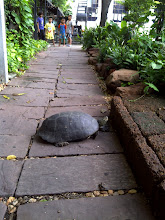The Wandering Strays
By Daniel Koster
“That dog is going to die if we don’t feed it,” I said as I pointed to a Mexican stray with his ribs protruding from his sides. Otherwise, it was a lovely mutt, most likely possessing a fair deal of Dalmatian blood.
I was in college. I was in Mexico. What had brought me there was a service/immersion trip to the Tijuana region of the Ameri-Mexican border. For a week-and-a-half, I lived with my peers in solidarity alongside some of the developing country’s poorest. On this afternoon, we found ourselves being served lunch at a facility that harvested honey from beehives. Right before lunch, our group gathered around one of the Mexican ladies as she explained to us the mission of the farm that we were visiting. A member of our team translated her monologue into English.
“The honey will be harvested and put into tubes,” her words were translated by a young man who had volunteered to guide our group. “From here, it will be distributed and sold to members of the community. Its invaluably healthy, compared to what the children are used to eating. They love junk food,” he chuckled. “Additionally, it greatly helps children develop resistance to local allergens…” The young man continued on and eventually, lunch was served.
“These ladies can cook,” one of the girls announced to the group. Everyone’s head was buried in a plate.
“Like nothing I’ve ever eaten,” I responded. By the end of my meal, I had eaten so much that I felt as if I had wrapped a tire around my waist.
All the while, I knew that there were those who would be granted no such feast. Countless human stomachs all across Latin America would go hungry. These countless stomachs belong to countless faces that to this day lack voices as far north New York, as far north as San Francisco, or DC. These faces were hidden within the communities we were visiting, or they could be seen in plain sight on the streets. Today, children, women and men would all go hungry. Yet some of these faces were on all fours, circling our tables as we ate. Some of these faces were being tormented by the smell of fresh beans and newly heated tortillas.
One face in particular caught my attention—it was here that I encountered the aforementioned dog. Sitting with perfect K-9 posture, my new friend eyed me. Ehh--more accurately, he eyed my tortilla. Regardless, his eyes revealed that I was his last shot at life. Like moths to a flame, his presence at our meal was drawing quite a crowd of my team members.
“Why isn’t there an ASPCA down here? I hate to see these dogs on every corner,” a girl remarked. “How hard could this problem be to fix?”
“Considering how many people are going hungry in this city alone, something tells me that stray dogs aren’t on the top of the Mexican government’s list of priorities,” I reminded. “I licked my plate clean, now its this guy’s turn.”
I exited the hot Mexican sun and stepped into the building to grab a handful of tortilla chips. I knew I had to be subtle. To feed a stray inhabitant of the Mexican streets is an action universally looked down upon.
I knew what I had to do. With ten to fifteen tortillas on a plate, I reentered the Mexican-midday-inferno. I looked over at the girl to my right, a short and pretty brunette that I had had my eye on throughout the course of the trip. I locked eye contact, and with a flat affect said, “woops.” I kicked my toe into cinderblock, and executed a control fall to the ground. Tortillas rained down upon my Dalmatian-mix.
“Don’t let the dog get those!” Our trip’s supervisor, had been wise to my wily-ways. “I know its difficult to see them standing there like this. But the area is covered with strays, and if we feed this little guy now, he’s never going to leave the people who live here alone.” Like a swat team on the ready, from either side, members of the team shooed the dog away from his prospective meal.
“Nice try,” the girl that once stood to my right consoled.
“We’re feeding that dog, or I’m walking back to Baltimore,” I openly declared.
“Count me in,” she smiled.
“We can have our cake and eat it too. We won’t feed him here. It’ll just upset everyone,” I told her.
The two of us, united for the first time, began to pick up the now dusty tortillas that had fallen in the dirt. All the while, the dog’s eyes were locked on the plate, craving what must have felt so close, yet so far. We walked down the driveway, through the gate, and out onto the street.
“We’ll walk a block or two,” I suggested.
“Is that really going to trick the little guy?” she asked. “He’ll be back as soon as he’s done.”
“Principle.” I clarified.

That day, I acquired an invaluable commodity. During my entire trip, I had seen so many hungry people. I had been introduced to so many problems with no realistic solutions in sight. I wished often that I could multiply myself by a thousand. A million. Only then could I feed all of the children that Mexico needed fed, mix all the cement that Mexico needed mixed. Only then could I irrigate every dusty football field or dry farmland in Latin America. But I can’t. I am one boy, becoming one man—not a thousand men. Yet through this K9, I have since found a way to justify the baby steps. I’ve learned that while I may be damned should I try and fix everything, everyone will be damned should I try and fix nothing.
After we took our two or three block walk, we placed the plate on the curb.
“I think he’s happy,” she observed.
“Then allow me to live vicariously through him,” I suggested.
She leaned against me, her arm locked with mine. We took a few steps back and watched our new friend eat.
 She does this before every match.
She does this before every match.











